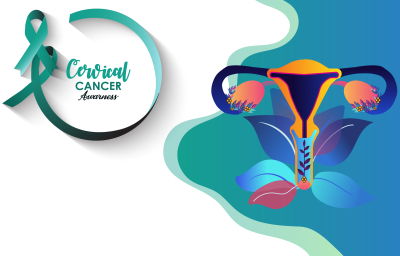
New Brunswick, N.J., January 1, 2024 – Cervical cancer is one of the most preventable cancers, yet nearly 14,000 women in the U.S. are diagnosed with the disease each year, according to the American Cancer Society. Sonali Patankar, MD, FACOG, gynecologic oncologist in the Gynecologic Oncology Program at Rutgers Cancer Institute and RWJBarnabas Health, shares more information about cervical cancer trends and prevention.
Cervical cancer can develop at any age, however, there are some trends.
- Cervical cancer is most commonly diagnosed in females between ages 35 and 44 years.
- The average age at the time of diagnosis is 50 years old.
- Over 20 percent of cervical cancer diagnoses are in females who are over 65 years old.
Nearly all cervical cancer cases are due to a viral infection known as HPV (human papillomavirus). People with healthy immune systems are able to clear the virus within one to two years, but when high-risk strains infect specific cells of the cervix, it can lead to abnormal cell growth and precancerous changes. Over time and with persistent infection, this can lead to cervical cancer. The Centers for Disease Control and Prevention (CDC) recommends children receive two doses of the HPV vaccine at age 11 or 12, although the series can be started at age 9. The vaccine is approved to be administered until the age of 45, but it is more effective if received at an earlier age. It is recommended that parents talk to their child’s doctor to determine if the HPV vaccine is right for them.
Cervical cancer is the only gynecologic cancer that can be prevented. Advances in cervical cancer screening and the use of the HPV vaccine have led to great improvements in this statistic. Regular Pap tests and testing for HPV can detect precancerous changes that occur in cells and can eventually become cervical cancer. Women between the ages of 21 and 65 are typically screened, but the frequency varies depending on age and other factors.
Maintaining a healthy weight, being physically active and eating a healthy diet contribute to cancer prevention along with avoiding or quitting smoking. Additionally, all women should discuss a routine examination schedule with their doctor, as other factors may influence the frequency of a gynecologic exam, related tests and vaccines.
Dr. Patankar is also an assistant professor of obstetrics/gynecology and reproductive sciences at Rutgers Robert Wood Johnson Medical School. Rutgers Cancer Institute and RWJBarnabas Health is the state’s leading cancer program and only National Cancer Institute (NCI)-designated Comprehensive Cancer Center.
For journalists – contact:
Krista Didzbalis
Media Relations Specialist
732-507-8307
krista.didzbalis@rutgers.edu

